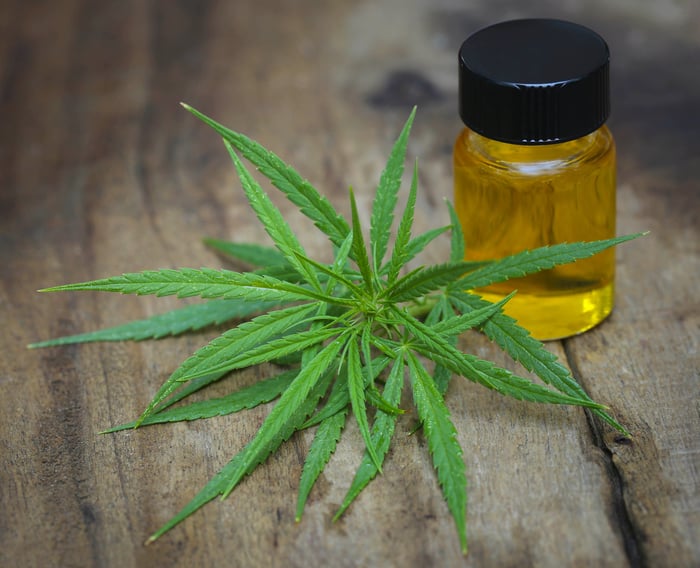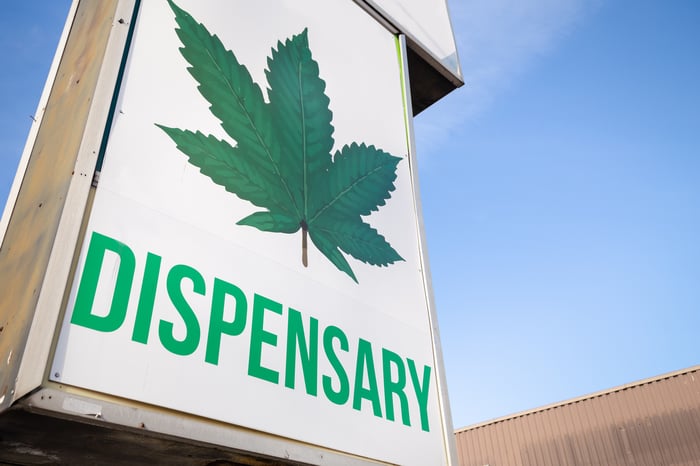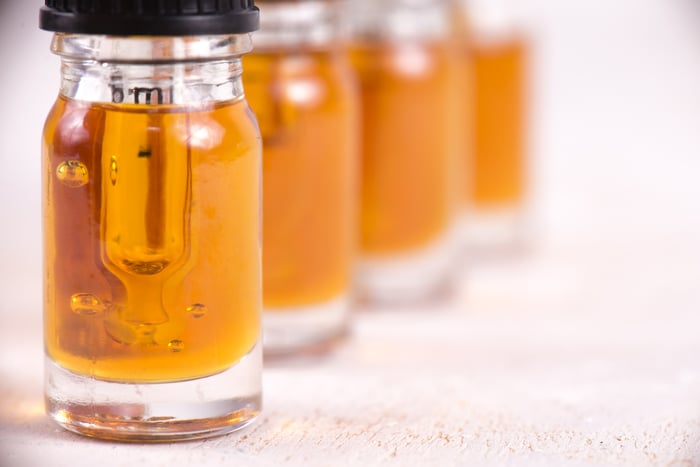Following a blazing hot start to the year, marijuana stocks treaded water in the month of March. The Horizons Marijuana Life Sciences ETF, which is comprised of about four dozen pot stocks with various weightings, fell a little more than 2%, inclusive of its dividend distribution, last month.
On a broader basis, of the 50 pot stocks I screened, 24 ended the month lower, with 26 moving higher. But unlike January, which saw 15 marijuana stocks surge by more than 50%, there weren't nearly as many double-digit percentage moves in March.
However, this doesn't mean there weren't standouts. Of the 26 advancers, six managed to gain at least 23% in March, thus earning them the title of the "Best Marijuana Stocks in March." Here they are, listed in descending order.

Image source: Getty Images.
Charlotte's Web Holdings: Up 33%
The top-performing pot stock in March was hemp-derived cannabidiol (CBD) products manufacturer and distributor Charlotte's Web Holdings (CWBHF -2.48%), which rose 33%. Charlotte's Web, which already had its products in close to 3,700 retailers across the U.S. as of the end of last year, has really benefited from the passage of the Farm Bill, which was signed into law by President Trump in December. The Farm Bill legalized hemp and hemp-derived CBD products (CBD is the nonpsychoactive cannabinoid best known for its perceived medical benefits), which should help the company get its CBD lineup in new retail doors.
Also helping was yet another solid quarterly report. Last week, Charlotte's Web reported fourth-quarter sales growth of 71%, a 63% increase in gross profit, and yet another quarter where it generated a true operating profit, without the assistance of one-time benefits or fair-value adjustments on biological assets. With most pot stocks losing money on an operating basis, Charlotte's Web is a true rarity in the early going.

Image source: Getty Images.
Village Farms International: Up 32%
No marijuana stock has been hotter since the year began than Village Farms International (VFF -6.92%), which added another 32% gain in March. For the year, the company's share price has more than quadrupled.
At first, investors appeared to be enamored with Village Farms' uplisting from the over-the-counter (OTC) exchange to the Nasdaq in February. Being listed on a major exchange next to time-tested companies can significantly improve volume-based liquidity, and it rolls out the red carpet for Wall Street to initiative coverage and/or make investments -- investments that may not happen with OTC-listed companies.
But last month, attention turned to an exceptionally small profit produced by Pure Sunfarms, the joint venture cannabis grow facility spanning just over 1 million square feet of cultivation space. Pure Sunfarms combines vegetable-growing facilities owned by Village Farms with Emerald Health Therapeutics' cannabis expertise. Emerald Health is responsible for retrofitting these greenhouses for pot production. With roughly 80% of Pure Sunfarms' delta greenhouse cultivation space licensed by Health Canada, investors look to be excited about an expected jump in sales very soon for both companies.

Image source: Getty Images.
Origin House: Up 32%
Another top performer last month was Origin House (ORHOF), which is headquartered in Canada but has gone all-in on California's cannabis distribution business. Origin House galloped higher by 32% after unveiling its unified distribution platform in the Golden State and completing a debt conversion.
The company's distribution platform is now known as Continuum, and it includes owned distributors such as RVR Distribution and Alta Supply. The press release notes that Continuum has had early success in landing exclusive distribution partnerships, such as with Henry's Original and Humboldt's Finest. With very few distribution licenses handed out in California, Origin House is hoping that an early cannabis glut in the state will give way to a steady stream of cash flow for the company as a vital middleman of the weed supply chain.
Origin House also announced that it would be converting about 33 million Canadian dollars of debt into common stock. Although this action is dilutive, it'll ultimately remove this debt from the company's balance sheet and provide added near-term financial certainty.

Image source: Getty Images.
Harvest Health & Recreation: Up 28%
Vertically integrated dispensary chain Harvest Health & Recreation (HRVSF) had itself quite the month (a 28% gain) after announcing a transformative deal to acquire privately held Verano Holdings for $850 million in stock.
The deal, should it close, would be the largest U.S.-based pot transaction in history. More than just setting records, it'll provide Harvest Health with a bounty of retail, cultivation, and manufacturing licenses that it can use to expand into 16 states and operate close to 200 facilities. The combination will ultimately have 123 retail dispensary licenses, but will be aiming to have 70 stores, 13 cultivation farms, and 13 processing facilities open by the end of 2019.
Harvest Health has also turned heads as one of the very few pot stocks to be profitable on an operating basis. Charlotte's Web, for example, is a little less of a surprise since it's simply dealing with producing one product type (CBD) and selling it for a juicy margin. With Harvest Health, it's remodeling or constructing new stores, constructing or retrofitting grow farms, and building processing facilities. That's normally a very cost-intensive process, but the company has nevertheless managed to remain profitable on an operating basis.

Image source: Getty Images.
CV Sciences: Up 23%
Like Charlotte's Web, CV Sciences (CVSI 1.58%) has also benefited from the CBD craze. CV Sciences' line of hemp-derived CBD products pushed into more than 2,200 retail locations in 2018, which is a 45% increase from the previous year. According to the Brightfield Group, global CBD sales can grow by 147% annually between 2018 and 2022, so this puts CV Sciences in the thick of a major growth trend.
The bulk of the excitement last month came from the company's fourth-quarter and full-year operating results on March 12. CV Sciences reported record full-year sales of $48.2 million, a 133% year-over-year increase, as well as record net income of $10 million, which reversed a year-ago net loss of $4.9 million. Logistically, the company's $0.09 full-year profit doesn't exactly make CV Sciences a value stock, but the mere fact that it's a profitable pot stock on an operating basis allows it to stand out in an otherwise crowded industry that's losing money hand over fist.

Image source: Getty Images.
Cresco Labs: Up 23%
Last, but certainly not least, shareholders of vertically integrated cannabis company Cresco Labs (CRLBF 6.83%) have to be pleased with the company's 23% gain in March. With expenditures ramping up in the dispensary space, Cresco was able to stand out by announcing its entrance into two new markets.
Last week, the company announced that it had completed the appropriate paperwork and been granted pre-approval to enter Michigan, which legalized recreational marijuana in the November 2018 election. Though Michigan has an estimated medical cannabis community of almost 300,000 patients, it'll be the state's adult-use consumers who will really pad vertically integrated dispensaries' bottom lines.
Then, two weeks ago, Cresco Labs announced a $120 million cash-and-stock deal to acquire privately held VidaCann, which will move it into the lucrative Florida market. The acquisition will provide Cresco with a medical marijuana treatment center license to grow, process, manufacture, distribute, and dispense in-house products in up to 30 retail dispensaries in the state. It's an all-out escalation war among multistate dispensary operators, and investors are happy with Cresco going on the attack, so to speak.





